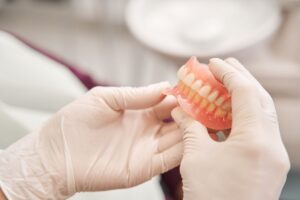
Dentures are the tried-and-true way to rebuild your grin after tooth loss. They’re a versatile solution that can be adapted to fit your unique circumstances. Whether you need a full or partial set, they allow you to eat, speak, and eat more normally so you can go back to feeling like yourself. Although they can last up to 15 years with the right care, your dentures will probably need to be repaired or replaced at some point. But how will you know when they’re nearing the end of their lifespan?
Continue reading to learn about 4 indicators that let you know it’s time for new dentures!
Symptom #1: Slurred Words
Your jawbone begins to thin after tooth loss, and in time, the restoration that once fit like a glove can become loose and shifty in your mouth. If you’ve noticed that you’re slurring words or having a hard time enunciating certain sounds, then it’s time to contact your dentist. They might be able to reshape the base so it fits, but in many cases, it’s best to get new dentures.
Symptom #2: Broken Teeth
Your prosthetics restore your smile’s appearance and functionality, which can improve your confidence and enhance your daily quality of life. However, if some of the pontics (artificial teeth) are broken, then you might start to feel self-conscious about the way you look. Chips can also interfere with your chewing power, which can lead to gastrointestinal issues or malnutrition. That means replacing your dentures can potentially improve your overall health.
Symptom #3: Discoloration
Your dentures are built from porcelain that’s less porous than natural teeth, but they can still soak up pigments from darkly colored foods and drinks that stain their surface. One of the first things people notice about you is the quality of your grin, and if yours is discolored, you might be remembered for the wrong reasons. If your restoration is starting to look drab, you might want to consider a new one for cosmetic reasons.
Symptom #4: Gum Irritation
Dentures form a tight suction against your gums to remain in place, but as your jawbone thins after tooth loss, they can become too loose to form a tight enough bond. This can cause slight movements and friction every time you eat and speak, which can eventually cause aches and inflammation. Plus, germs can penetrate any blisters or sores and infect them. If it hurts to put them in your mouth, it’s probably time to replace them.
If you’re still not sure whether you need new dentures, the best way to find out is to schedule a consultation with your dentist!
About the Author
Dr. Andrew Tadros has 10+ years of experience helping families in the greater Dallas community build and maintain happy, healthy smiles. He earned his undergraduate degree from the University of the Pacific in Stockton, CA, and then achieved his Doctor of Dental Surgery at the University of the Pacific Arthur A. Dugoni School of Dentistry. He combines a non-judgmental approach with state-of-the-art technology to help patients feel at ease while increasing the accuracy of treatment results. If you’re worried about your dentures, you can request an appointment on the website or call (469) 917-7444.


